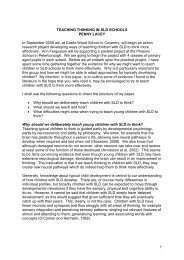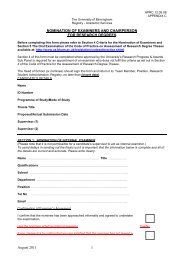American and Canadian Studies Year Abroad Information
American and Canadian Studies Year Abroad Information
American and Canadian Studies Year Abroad Information
You also want an ePaper? Increase the reach of your titles
YUMPU automatically turns print PDFs into web optimized ePapers that Google loves.
itself, “lecturers” are “professors,” “postgraduates” are “graduates” <strong>and</strong> the academic years are divided among“first-years,” or “freshmen” among some not-so-PC universities, “sophomores,” “juniors” <strong>and</strong> “seniors.”* Social Life at US <strong>and</strong> <strong>Canadian</strong> Universities: Although each university has its own social customs <strong>and</strong> studentbody make-up that distinguish it from others, there are some continuities that may differ from the social life youare used to at Birmingham. Generally, social life at <strong>American</strong> <strong>and</strong> <strong>Canadian</strong> universities is divided amongstudent organisations, social clubs, sports teams <strong>and</strong> other extra-curricular activities. Membership in any ofthese is generally open to the entire student body <strong>and</strong> opportunities to join are posted throughout the university.Membership to sports teams is generally limited through try-outs. Although these try-outs are typically open tothe entire university, competition is extremely high at large universities, particularly for US Division I teams.However, almost all universities offer a wide range of club <strong>and</strong> intramural teams for students who want to play asport without signing a contract.Non-university related social life really depends on the university -- UCLA <strong>and</strong> the University of BritishColumbia clearly offer different social dynamics as a result of their respective urban <strong>and</strong> coastal-parkl<strong>and</strong>settings. Generally, US, <strong>Canadian</strong> <strong>and</strong> British students participate in the same after-school activities: going tothe cinema, eating out, partying. However, there are particular social customs <strong>and</strong> even legal restrictions thatmay affect your social habits. As you probably know, the legal drinking age throughout the US is 21. While thisis upheld to varying degrees across the country, most university towns are strict enforcers of the drinking agelaw. Most bars <strong>and</strong> liquor distributors require proof of age before an individual can purchase alcohol. Generally,the only forms of identification acceptable are a valid photo driver’s license or a passport. Again, this law isupheld to varying degrees – some bars may require two forms of photo identification at the door while otherswill kindly overlook your babyish looks <strong>and</strong> take your word that you are 21. However, bear in mind penaltiesfor under-age drinking can be harsh <strong>and</strong> that police often targets “university bars.” Fines can be in excess of$1,000 <strong>and</strong> arrests are not unheard of. Rumours about bars that don’t “ID” are rampant on university campuses.If you are under 21, you have to weigh the consequences <strong>and</strong> make your own judgment about whether a fine, apossible night in local jail or a mark on your passport is worth a few beers.Good news for students going to Canada: you may continue your student socialising behaviour unimpeded bythe law. The <strong>Canadian</strong> drinking limit is 18 in Quebec <strong>and</strong> Alberta <strong>and</strong> 19 in the rest of the country.If the US drinking laws seem too oppressive, perhaps the knowledge that social life does not tend to revolvearound the pub will brighten the prospect of studying abroad. Most US <strong>and</strong> <strong>Canadian</strong> students base their sociallife around campus based activities, whether it be all-campus parties, Greek [fraternity or sorority] events oruniversity sporting matches. Student organisations often raise money through all-campus parties held on thecampus in a university building. These events tend to be inexpensive, a $3-5.00 cover charge for all you c<strong>and</strong>rink. Sporting events, particularly at larger universities, are also a major attraction for students. The cost <strong>and</strong>availability of tickets to these events depends on the university – tickets for a UCLA basketball game will bemore expensive <strong>and</strong> harder to get a hold of than tickets to a Santa Barbara game, for example.The Greek System: Immortalised in films like Animal House <strong>and</strong> Revenge of the Nerds, the Greek System is apredominant, but by no means dominant, part of the US <strong>and</strong> <strong>Canadian</strong> university dynamic. The Greek System iscomprised of male (fraternity) <strong>and</strong> female (sorority) social organisations with Greek letter titles (Delta DeltaDelta or Kappa Kappa Gamma, for example). Generally, fraternities <strong>and</strong> sororities are nationally organised,financially independent from the university <strong>and</strong> supported through the annual dues of its members. As privatesocieties, it may seem strange that Greek organisations can play a large role in university social life. Basically,while only a small percentage of students will join a Greek organisation as a member, Greek functions aregenerally open to the entire university. Attitudes toward Greek organisations vary among students <strong>and</strong>administrators in the US <strong>and</strong> Canada <strong>and</strong> each university maintains its own policy to reflect the wishes of thestudent body. As most university students in the US <strong>and</strong> Canada have discovered, if Greek-life is something thatdoes not interest you, it need not be a part of your university experience.BACK







![Benyamin Asadipour-Farsani [EngD Conference abstract]](https://img.yumpu.com/51622940/1/184x260/benyamin-asadipour-farsani-engd-conference-abstract.jpg?quality=85)








